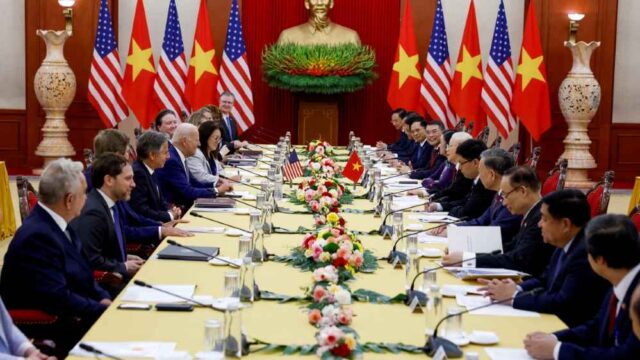The United States and Vietnam have unveiled a series of groundbreaking business agreements spanning key sectors, with a particular focus on artificial intelligence (AI) and aviation. This collaborative effort comes at a time when both nations are navigating challenging macroeconomic conditions, and it promises to open new doors for trade and innovation.
The initiative gained momentum during a high-level summit that brought together U.S. President Joe Biden and prominent Vietnamese government officials and corporate leaders. Among the notable attendees were executives from Vietnamese powerhouses like VinFast, Vietnam Airlines, and MoMo, along with representatives from major U.S. corporations such as Google, Amkor, Boeing, and Marvell.
AI and Semiconductors Take Center Stage
One of the most significant outcomes of this summit was the shared commitment to strengthen collaboration in the fields of AI, cloud computing, and semiconductors. President Biden revealed Microsoft’s plans to develop a generative AI product specifically tailored for the Vietnamese market, aimed at enhancing workplace efficiency. This endeavour fills a crucial gap in the market, as Vietnamese-language generative AI models are currently scarce.
Amkor, a semiconductor manufacturer, made a groundbreaking announcement, revealing plans to establish a $1.5 billion semiconductor manufacturing facility set to commence operations in October. This facility will focus on assembling AI chips, particularly for training large language models. Furthermore, Marvell and Synopsys are also gearing up to establish chip design hubs in Vietnam. These strategic moves mirror the United States’ efforts to explore new markets for semiconductor materials, especially in the wake of China’s restrictions on the export of gallium and germanium, two rare elements essential for AI chip production.
While there is a global race to establish a regulatory framework for AI technology to prevent misuse, the U.S. is planning a meeting with major AI developers to discuss regulations. This development comes as China has already implemented stringent rules for its AI firms, leading to the launch of over 70 new generative AI tools within the country. While concerns about the impact of AI on jobs persist, experts suggest that Web3 smart contract developers may be less affected by generative AI tools due to the relative immaturity of these tools and their potential security vulnerabilities.
The strengthening of U.S.-Vietnam relations through these high-tech business agreements signifies a significant shift in the global economic landscape. These partnerships offer both nations the opportunity to tap into new markets and cutting-edge technologies while fostering healthy global competition. The implications for the future of AI, semiconductors, and job markets are yet to be fully understood, but one thing is clear: the race to dominate the AI space is intensifying. As the United States and Vietnam embark on this collaborative journey, the world watches with anticipation to see how this alliance will shape the future of innovation and global economic dynamics.









